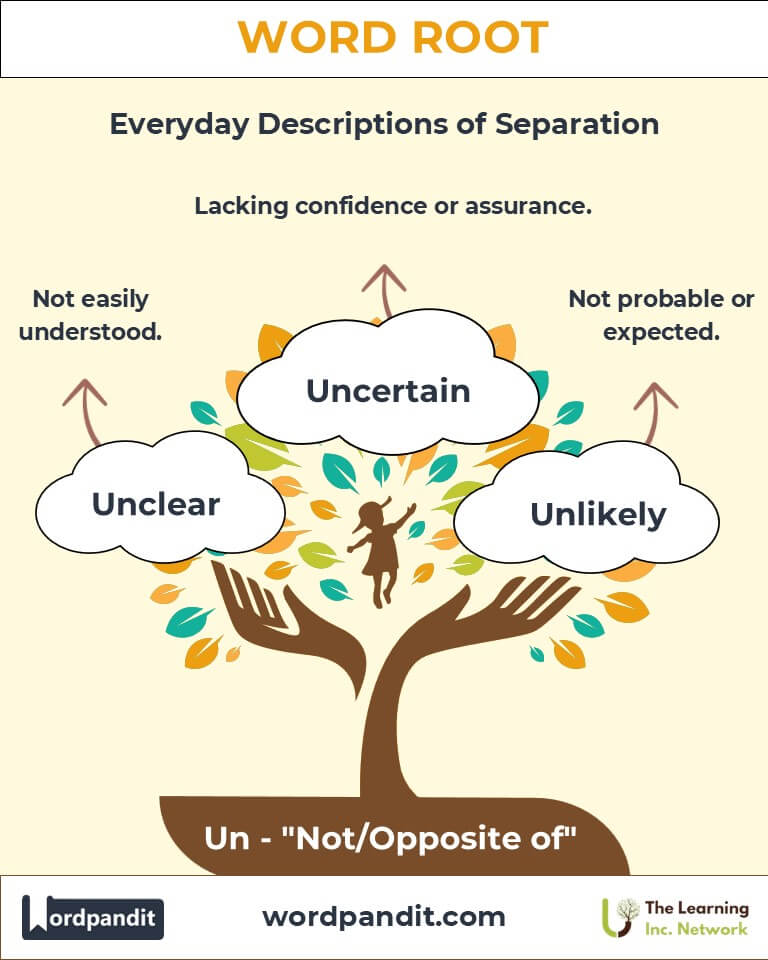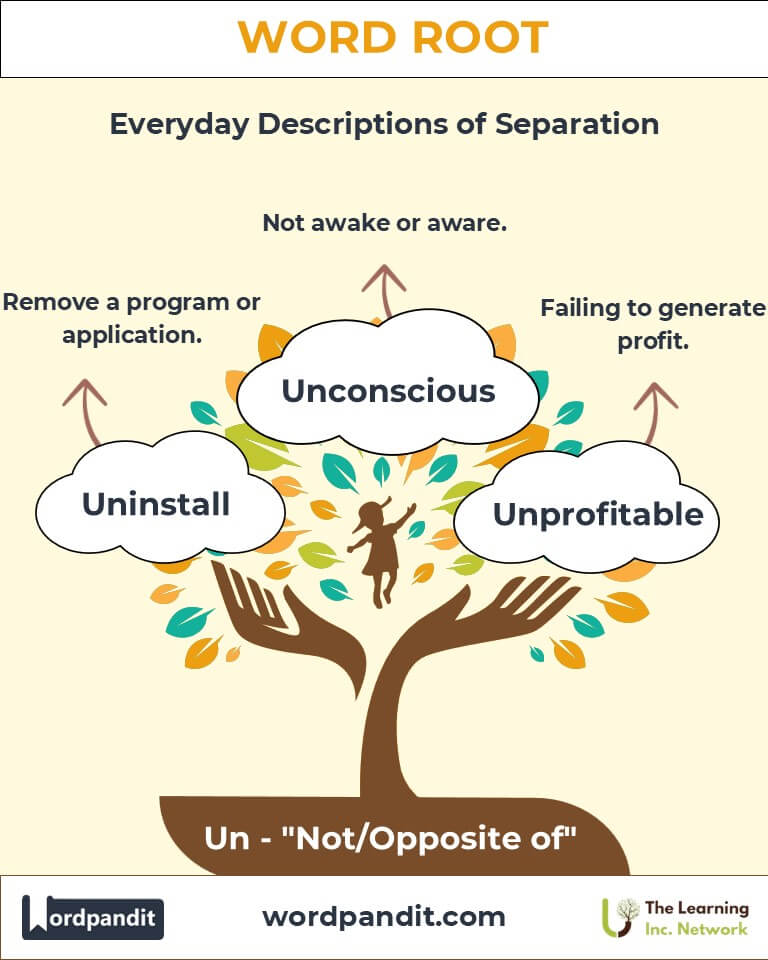Un: The Prefix of Negation and Opposition in Language
Discover the versatility of the prefix "un," a linguistic powerhouse derived from Old English, meaning "not." This simple yet impactful prefix transforms words into their opposites, weaving its way through countless expressions in English. Explore its role in communication, creativity, and clarity in this comprehensive guide.

Table of Contents
- Introduction: The Essence of "Un"
- Etymology and Historical Journey
- Mnemonic: Unlocking the Power of "Un"
- Common "Un"-Related Terms
- "Un" Through Time
- "Un" in Specialized Fields
- Illustrative Story: "Un" in Action
- Cultural Significance of "Un"
- The "Un" Family Tree
- FAQs About the "Un" Word Root
- Test Your Knowledge: "Un" Word Root Quiz
- Conclusion: The Living Legacy of "Un"
Introduction: The Essence of "Un"
Imagine a word that can instantly reverse meaning—this is the power of "un." Pronounced simply as "uhn," it signals negation or absence, as seen in words like "unclear" and "uncertain." This prefix, rooted in English and related languages, is an indispensable tool for expressing contradiction and contrast across everyday and specialized vocabularies.

Etymology and Historical Journey
The prefix "un" originates from Old English un-, meaning "not," and shares roots with Old High German, Gothic, and Sanskrit equivalents. Its usage has remained consistent for centuries, evolving from classical texts to modern vernacular. From medieval negations to contemporary opposites, "un" has shaped the way we convey absence, opposition, and negation.
Mnemonic: Unlocking the Power of "Un"
Think of a light switch labeled "Un." Flipping it off plunges a room into darkness—symbolizing the prefix’s ability to negate or reverse.
Mnemonic Device: "Un" flips meaning off, turning clear to unclear and certain to uncertain!
Common "Un"-Related Terms
- Unclear (uhn-kleer): Not easily understood.
Example: "The instructions were unclear, leading to confusion." - Uncertain (uhn-sur-tuhn): Lacking confidence or assurance.
Example: "She was uncertain about her future plans." - Unlikely (uhn-lahyk-lee): Not probable or expected.
Example: "It’s unlikely to rain today." - Unfinished (uhn-fin-isht): Incomplete or not yet done.
Example: "The painting remained unfinished for years." - Unseen (uhn-seen): Not observed or noticed.
Example: "The unseen dangers of the jungle were a constant threat."
"Un" Through Time
- Old English Usage: Early forms such as unriht ("unright") appeared in religious texts to denote moral wrongness.
- Modern Adaptations: Words like "undone" and "unthinkable" emerged during the Renaissance, showcasing "un"’s adaptability.
- Contemporary Use: Today, "un" thrives in casual and formal English, creating terms like "unsubscribe" in digital contexts.
"Un" in Specialized Fields
- Technology: Uninstall – Remove a program or application.
Example: "You must uninstall outdated software to avoid security risks." - Medicine: Unconscious – Not awake or aware.
Example: "The patient remained unconscious after the surgery." - Business: Unprofitable – Failing to generate profit.
Example: "The unprofitable venture was shut down." - Law: Unlawful – Not conforming to the law.
Example: "His actions were deemed unlawful by the court." - Science: Unstable – Lacking equilibrium or prone to change.
Example: "The compound was unstable under high temperatures."
Illustrative Story: "Un" in Action
In a quiet town, Anna faced a series of uncertain events. The weather was unclear, her job prospects seemed unlikely, and an unfinished project loomed large. But by confronting her fears, she turned the unseen obstacles into opportunities, proving that "un" doesn’t always have the last word—it’s how we respond to it.
Cultural Significance of "Un"
The prefix "un" reflects a universal human need to express what is lacking or absent. From Shakespeare’s “unseen to the eye” to digital-age terms like "unsubscribe," "un" embodies the power of contrast and choice in language and culture.

The "Un" Family Tree
- In- (not, opposite of):
Example: Incomplete, Invisible. - Non- (absence of):
Example: Nonexistent, Nonsensical. - A-/An- (Greek: without):
Example: Amoral, Anaerobic.

FAQs About " Un "
Q: What does "un" mean?
A: The prefix "un" means "not" or "the opposite of." It reverses the meaning of the word it attaches to, indicating absence, negation, or opposition. For example, "unclear" means "not clear," and "unseen" means "not seen."
Q: Is "un" always used as a prefix?
A: Yes, "un" functions exclusively as a prefix in English, modifying base words. It cannot stand alone and always needs to attach to another word to create meaning, such as in "unfit" or "unfortunate."
Q: Can "un" attach to any type of word?
A: No, "un" most commonly attaches to adjectives (e.g., "uncertain"), verbs (e.g., "undo"), and past participles (e.g., "unspoken"). It is rarely used with nouns unless they are compound (e.g., "untruth").
Q: What’s the difference between "un-" and "in-" as prefixes?
A: Both "un-" and "in-" mean "not," but "un-" is typically used with Germanic words (e.g., "unhappy"), while "in-" is used with Latin-based words (e.g., "invisible"). Despite their shared meaning, they are not interchangeable due to their etymological origins.
Q: Can "un" indicate something more than simple negation?
A: Yes, in some cases, "un" implies a deeper transformation or reversal rather than mere absence. For instance, "unravel" doesn’t just mean "not raveled" but also conveys the active process of disentangling something.
Test Your Knowledge: " Un " Mastery Quiz
1. What does "un" signify?
2. Which word means "not finished"?
3. What is the opposite of "likely"?
4. Which field commonly uses "unstable"?
5. What does "unsubscribe" mean?
Conclusion: The Living Legacy of "Un"
The prefix "un" continues to be a cornerstone of English, enabling clarity and precision by signifying negation or absence. Its simplicity belies its linguistic depth, making it indispensable across fields and eras. Embrace the power of "un" to explore, challenge, and redefine meaning in language and life.














